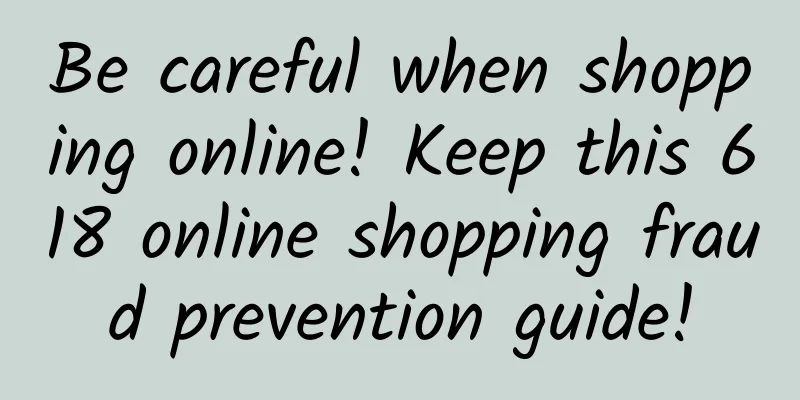Be careful when shopping online! Keep this 618 online shopping fraud prevention guide!

|
The annual 618 is here again! Have you already started the "buy, buy, buy" mode? Scammers have also started "activities", and online shopping fraud methods are emerging in an endless stream. Friends must be careful! The editor has counted several of the most common online shopping scam scenarios, let's take a look! 1. Pre-sale scam Many businesses send pre-sale information of new products to old customers via SMS, which is a convenient link for criminals. Criminals use "pre-sale" and "advance purchase" as bait to send website ordering links to users. In fact, these links have been implanted with Trojans or are fake phishing websites. Once clicked, Trojan viruses will be implanted in the mobile phone to steal user information. The editor reminds you: Do not trust the shopping text messages related to 618, and be cautious when clicking on unknown links, because the links are likely to contain Trojan viruses that can steal customer information and account funds in seconds. 2. Fake red envelope scam Before 618, major e-commerce platforms will distribute red envelopes to warm up their promotional activities. Criminals take this opportunity to distribute fake 618 red envelopes, spread phishing links, trick people into clicking on them, obtain users' personal information, steal bank card accounts, etc. Editor's note: It is best to claim the 618 red envelope discounts through official channels. Once you receive a suspicious "red envelope", you should call the official customer service hotline of the e-commerce or third-party payment website as soon as possible to confirm. If you accidentally click on it, you should immediately turn off the mobile network, change the passwords of important accounts such as online banking and Alipay, and use security software to check and kill Trojans and viruses. 3. Fake order rebate scam Criminals send fraudulent messages to lure victims with easy work and high salaries. After the victims contact them, they are further induced to "place an order and pay" by scanning WeChat or Alipay QR codes, but in fact the operation is to transfer money to the criminals' accounts. The editor reminds you: Don’t have the mentality of “seeking small profits” and “making big money easily”, don’t easily believe in the so-called high returns on the Internet, and don’t easily click on links sent by strangers; online part-time jobs with “low threshold and high returns” and “pay first and then get rebates” are basically traps. 4. Points redemption scam Criminals impersonate e-commerce platforms to send points redemption notifications, tricking victims into clicking on website links, but the products on the website require additional fees and the quality cannot be guaranteed. Once the victim pays for the product, he or she cannot return the product or claim compensation, or even does not receive the product at all after payment. The editor reminds you: You should be highly vigilant when receiving such text messages, do not click on unfamiliar URLs at will, and do not place orders on websites without any qualifications or certification. Such websites have no platform supervision and pose great risks. 5. Cash on Delivery Scam Criminals will obtain customer information, fake express delivery orders, etc. from illegal channels, and then pretend to be couriers to contact consumers in advance, deliver fake goods to consumers, and claim "cash on delivery" to defraud money. Editor's note: When you encounter a "cash on delivery" courier, open the box and inspect the goods first. If it is not the item you bought, refuse to sign directly. After picking up the goods, remember to erase your personal information from the package to avoid personal information leakage. During the 618 shopping festival, remember the following points to protect your wallet! 1. If you receive a call from someone claiming to be a customer service representative, please do not believe it easily. You can first verify the transaction information on a regular website or obtain an official phone number through regular channels for verification. 2. Please do not provide verification codes, bank card balances, bank card passwords, etc. to "customer service personnel" easily, and do not follow their instructions; pay special attention to not providing verification codes, as this is the last line of defense. 3. When receiving a courier that requires payment on delivery, you should first carefully check the information and items, and refuse to accept any couriers of unknown origin to avoid being cheated; courier documents containing your personal information should be torn up or blackened before discarding to avoid being used by criminals. 4. When shopping online, you should choose merchants who have the qualifications to operate online. You should be vigilant about products whose prices are obviously lower than the market price. You should be careful to guard against and identify them, and beware of the trap of low-price temptation. Finally, I would like to remind everyone again: there are many scams in online shopping, so be careful when shopping! Don’t fall into the trap! |
<<: Transcontinental wireless communication, he turned dreams into reality
Recommend
Is it useful to use dou+ if TikTok has no views? Is Douyin DOU+ useful?
When operating a Douyin account, there may actual...
Galaxy Note4's four tricks
Samsung's new generation of giant screen flags...
Brand marketing and promotion, how to maintain brand vitality?
When Tencent was founded in 1998, it was actually...
Inventory | How did the “World Cup Game” trigger user growth?
This article is about the World Cup held every fo...
WeChat shows "the other party is typing", only these two situations will happen, please be aware
With such a wide user base, Zhang Xiaolong himsel...
Technology News丨Omicron strain becomes a "serious threat" to the UK; Japanese wholesalers sell Chinese eels as Japanese-made
【Today’s cover】 On December 18, the winter scener...
Blizzard! Temperature drops by more than 10℃! The first round of large-scale rain and snow weather in the Year of the Snake has arrived, please be careful when traveling →
Today (February 1) is the fifth day of the Spring...
Where are hybrid cars headed?
On June 13, the Legislative Affairs Office of the...
Inventory: The top ten things in the marketing industry in 2019
2019 is about to end. There is no doubt that this...
15 very "powerful" copywritings that are worth your consideration!
All the elements in an advertisement are for one ...
Summary of common questions about placing Toutiao ads?
Toutiao ads are information flow ads, which are r...
The latest APP listing guide for each app store!
The current domestic traffic is becoming increasi...
Jay Chou invests in an Internet cafe and tests it out: 300 yuan gets you access to the idol's office
In addition to being a famous singer, Jay Chou is...
Zhihu's "Wilson Formula" recommendation algorithm!
If operators or creators want their content to at...
Why does China launch so many satellites?
This article was reviewed by Liu Yong, space phys...






![Marketing node reminder in January 2018 [Dry goods collection]](/upload/images/67cc1646baa30.webp)


